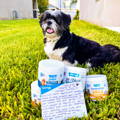Why Is My Dog So Itchy? 5 Reasons for Itchy Skin
Vet Verified
WRITTEN BY DR. HILLARY WOLFE
Jump to Section

Many concerned pet parents spend their time seeking answers to their dog's persistent itching––but the answer isn’t always clear! Understanding the root causes behind your dog's itchy skin is crucial for providing effective relief and improving their overall well-being.
In this comprehensive guide, we'll identify five primary reasons why your dog may be experiencing itchiness and discuss practical solutions to help alleviate their discomfort.
5 possible causes of your dog's itchy skin
It's common for dogs to experience itchy skin, but the reasons behind this discomfort can vary widely. Here, we'll explore five possible causes of your dog's itchiness and discuss how you can identify and address each issue effectively.
Seasonal Allergies
Seasonal allergies can wreak havoc on your dog's skin, causing relentless itching and discomfort. During certain times of the year, pollen, grasses, and other environmental allergens can trigger allergic reactions in sensitive dogs. Identifying and managing seasonal allergies is essential for providing relief and improving your dog's quality of life.

Food Allergies
Food allergies are another common culprit behind itchy skin in dogs. Proteins like beef, chicken, eggs, and less commonly, grains can trigger allergic reactions, leading to skin irritation and discomfort. Switching to hypoallergenic diets and working with your veterinarian to identify and eliminate allergens from your dog's diet can significantly improve their skin health. Homemade food can also be a great option for providing therapeutic nutrition for skin health. Always consult a veterinarian who has training in nutrition for complete and balanced recipes.
Environmental Allergies
Environmental allergens such as dust mites, mold, and pollen can also contribute to itchy skin in dogs. These allergens can be present indoors or outdoors, making it challenging to avoid exposure entirely. However, with proper environmental management, allergy medications (including immunotherapy injections), and regular grooming, you can help minimize your dog's allergic reactions and reduce their itching. Diagnostics may include blood or skin allergy tests to determine the exact underlying allergens that are causing your pet’s itchy skin.
Bacterial, Fungal, or Viral Infection
Skin irritation and dry skin can result from various factors, including harsh grooming products, frequent bathing, and environmental conditions. Maintaining a balanced diet rich in essential fatty acids, using gentle shampoos, and providing regular moisturizing treatments can help soothe your dog's skin and alleviate itching.
Fleas
Fleas are notorious for causing intense itching and skin irritation in dogs. Even a single flea bite can trigger an allergic reaction, leading to persistent scratching and discomfort. One classic symptom of a flea bite allergy is hair loss and redness around the hind end and base of the tail. Implementing effective flea control measures, such as regular flea prevention treatments and environmental flea eradication, is crucial for managing flea-related itchy skin issues.

How to relieve your dog’s itchy skin
Relieving your dog's itchy skin requires a multi-faceted approach that addresses the underlying cause while providing immediate relief from discomfort. The first step is to consult with your veterinarian for a thorough examination and proper diagnosis. Your vet will assess your dog's overall health, conduct skin tests if necessary, and identify the specific triggers contributing to their itching.
Once the cause of your dog's itchy skin is determined, your veterinarian will recommend a tailored treatment plan. This plan may include medications such as antihistamines or steroids to reduce inflammation and itching. For dogs with severe allergies, immunotherapy or allergy shots may be prescribed to desensitize their immune system over time.
In addition to medications, dietary changes can play a crucial role in managing itchy skin caused by food allergies or sensitivities. Your vet may recommend switching to a hypoallergenic or limited-ingredient diet to eliminate potential allergens and soothe your dog's skin. Adding an allergy supplement for dogs is also an option.
Alongside medical interventions, you can take proactive steps at home to alleviate your dog's itching. Regular grooming with gentle, hypoallergenic shampoos can help cleanse their skin without stripping away natural oils. Avoid over-bathing, as excessive bathing can dry out the skin and worsen itching. When bathing, be sure to use lukewarm to cool water as hot water will worsen itchiness.
Creating a comfortable environment for your dog is also essential. Keep their bedding clean and free from allergens, such as dust and pollen. Use air purifiers to reduce airborne allergens indoors, especially during allergy seasons.
Additionally, addressing any underlying stress or anxiety in your dog can help reduce itching triggered by emotional factors. Provide plenty of mental and physical stimulation, engage in regular exercise, and consider behavior modification techniques or calming supplements recommended by your vet.
Consistency and patience are key when relieving your dog's itchy skin. Follow your vet's guidance closely, monitor your dog's response to treatment, and communicate any changes or concerns with your veterinarian promptly. With proper care and a comprehensive approach, you can help your dog find relief from itching and enjoy a healthier, happier life.
Home remedies for your dog's itchy skin
While veterinary care is crucial for addressing the underlying causes of your dog's itchy skin, there are several home remedies that can provide additional relief and support their skin health.
Oatmeal Baths
Oatmeal is known for its soothing properties and can help relieve itching and irritation in dogs. Prepare an oatmeal bath by mixing finely ground oatmeal with lukewarm water until it forms a paste-like consistency. Bathe your dog in this oatmeal solution, gently massaging it into their skin for several minutes before rinsing thoroughly. Oatmeal baths can help calm inflamed skin and reduce itching.
Coconut Oil
Coconut oil has natural moisturizing and anti-inflammatory properties, which may help soothe mildly itchy skin in dogs. Apply a small amount of coconut oil to your dog's skin, focusing on areas prone to itching and irritation. Massage the oil gently to help it penetrate the skin and provide relief. Avoid using excessive amounts of coconut oil, as it can be greasy and may attract dirt.
Topical Treatments
There are various over-the-counter topical treatments available for itchy skin in dogs, such as soothing sprays or creams containing ingredients like aloe vera, calendula, or chamomile. These products can provide immediate relief from itching and promote healing of irritated skin, as can medicated shampoos and topical sprays designed for itch relief. Always follow the manufacturer's instructions and consult with your veterinarian before using any topical treatments on your dog. Never allow your pet to ingest these products!
Natural Supplements
Omega-3 fatty acids, such as those found in fish oil supplements, can help improve your dog's skin health from the inside out. These supplements have anti-inflammatory properties and can reduce itching and inflammation associated with allergic reactions. Consult with your veterinarian to determine the appropriate dosage of omega-3 fatty acids for your dog based on their size and health needs. A therapeutic dose is typically needed to elicit an effect on the skin.
Regular Grooming
Keeping your dog's coat clean and well-maintained can help prevent skin irritation and reduce itching. Use gentle, hypoallergenic shampoos specifically formulated for dogs with sensitive skin. Brush your dog's coat regularly to remove loose fur, dirt, and allergens that can contribute to itching. Be mindful of excessive grooming, as it can strip away natural oils and lead to dry, itchy skin. Using brushes with gentle bristles (e.g., silicone bristles instead of wire) can ensure a more gentle grooming experience for your canine.
Environmental Modifications
Identify and eliminate potential allergens in your dog's environment, such as dust, pollen, and mold. Wash your dog's bedding regularly in hot water to remove allergens and keep their living space clean. Use air purifiers or humidifiers to maintain optimal indoor air quality and reduce airborne irritants.
By incorporating these home remedies into your dog's care routine and working closely with your veterinarian, you can help alleviate their itching, promote skin healing, and improve their overall comfort and well-being. However, always consult with your vet before trying any new home remedies to ensure they are safe and appropriate for your dog's specific condition.
How Dermabliss can help with itchy skin on dogs
Dermabliss is a veterinarian-recommended solution for itchy skin in dogs. With its soothing formula, moisturizing properties, and gentle ingredients, Dermabliss is uniquely vet-formulated for relieving irritation and promoting skin health. Incorporating Dermabliss into your dog's grooming routine can provide long-lasting relief and support overall skin wellness. Be sure to ask your veterinarian if dermatological products like these could be a good addition to your pet’s allergy management plan.
Understanding why your dog is so itchy is key to addressing their discomfort effectively. Whether it's seasonal allergies, food sensitivities, environmental triggers, skin irritation, or flea infestations, there are solutions available to help your dog feel more comfortable and itch-free! Working closely with your veterinarian and implementing appropriate care strategies can make a significant difference in your dog's skin health and overall happiness.
Join the Pack!

Sign up for exclusive deals, curated pet tips from veterinarians, and product launches!
Pet Parents are Also Reading
March, 2023
May, 2022
April, 2023
April, 2024
Written By a Vetnique Vet

Dr. Hillary Wolfe, DVM, CVFT
Dr. Wolfe is a traveling veterinarian and the owner of Tula Veterinary Nutrition. She is passionate about enhancing pet health and longevity through food, with a strong focus on natural nutrition and homemade diets.
Sign up for exclusive deals, curated pet tips from veterinarians, and product launches!






















